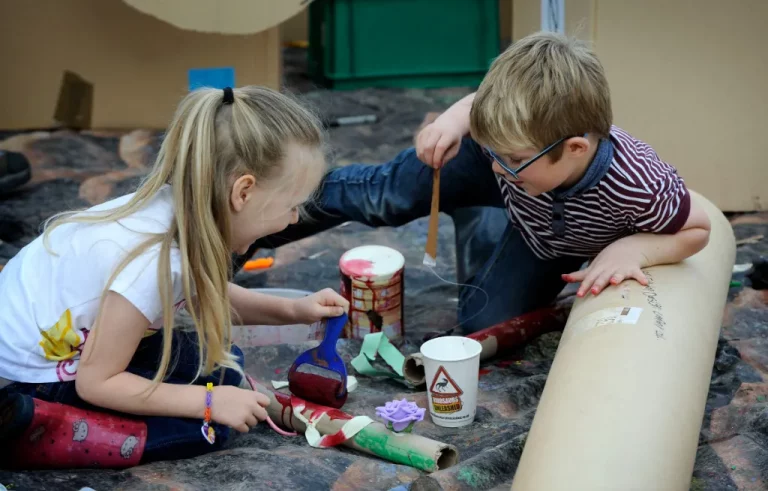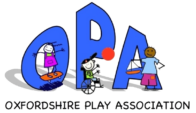Playwork
Who are Playworkers?
Playworkers work with children and young people aged approximately 4-14 to provide them with rich play environments in which they can have free choice and control over their play, use their imaginations and develop their skills and knowledge at their own individual pace. They understand that children should not be in a cage – that they need space to be free range, make choices and explore the world. Playworkers aim to create a rich play environment that stimulates children’s natural drive to play.
Playworkers understand that play is a right for all children and young people, as declared by Article 31 of the United Nations Convention on the Rights of the Child. They know that children and young people have a natural drive to play, and that this play instinct has helped the human race (and many other animals) to evolve, and to develop skills that are useful, and often essential, for life. Play helps to develop many skills including:
- physical skills (e.g. climbing, jumping, balancing, fighting, strength, coordination, reactions, risk awareness)
- social skills (e.g. negotiating, sharing, debating, arguing, communication, listening, standing up for yourself)
- intellectual skills (e.g. problem-solving, reading, vocabulary, reasoning, time, general knowledge)
- creative skills (e.g. artistic skills (painting, mosaic, woodwork, drawing, etc), fine motor skills, imagination)
- emotional skills (e.g. regulation of emotions, resilience, empathy, understanding how feelings affect actions)
Playworkers understand that free play enables children and young people to ‘play out’ any difficult or confusing issues that affect their lives, and can have a therapeutic affect. ‘Free’ play is when children are able to direct and command their own play, with no adult interference, no adult rules (such as with board games) and no adult incentive (such as prizes).
Playworkers adhere to a guiding framework for their work called the ‘Playwork Principles’ (see below).
Playwork Settings
Playworkers work with age 4-14 (approximately) in a variety of environments, often in out-of-school settings such as after school clubs, breakfast clubs, holiday playschemes, playbuses, adventure playgrounds and as play rangers. They understand that children are exposed to a lot of education in their lives (through school, homework and classes) and although education is important, play is equally important as it increases health, happiness and wellbeing. The playworker’s job is to facilitate high quality play opportunities for children and young people, and they do this by preparing an exciting, stimulating and enticing play space, by only getting involved in play if asked to by a child/children and by valuing the playing child above all else.
The Play Cycle
Playworkers are able to observe a number of stages in a child’s play, and use the following terms to describe what is happening in play.
Play Drive: The idea to play starts inside the child’s mind, and they might then do an action or send out a signal (a Play Cue) to start the play.
Play Cue: a signal sent out by the child (to another child, children, adult, animal or even an inanimate object) inviting the other to join in with the play. For example, a child might throw another child a ball to catch, or they may say, “Shall we play?”
Play Return: this is a signal returned in response to a Play Cue showing that they would like to join in the play. For example, a child might catch a ball thrown to them, and throw it back.
Play Flow: When a child is absorbed in their play, they are in the Play Flow, which can last for minutes, hours or sometimes days at a time.
The Play Frame: The imaginary or real boundary around the child’s/children’s play, which can be altered by changing the space, people, things, etc in it to maintain and extend the Play Flow.
Annihilation: When a child/children decide to end the play (or when they are forced to end their play, or their play is interrupted by an adult) the Play Frame ‘pops’ and is extinguished, and the cycle of play ends.
The Play Cycle: All the above elements together constitute the Play Cycle, starting with the Play Drive and ending with annihilation of the play.
This comes from the ground-breaking Colorado Paper by Perry Else and Gordon Sturrock. You can find it here.
The Playwork Principles
These principles establish the professional and ethical framework for playwork and as such must be regarded as a whole. They describe what is unique about play and playwork, and provide the playwork perspective for working with children and young people. They are based on the recognition that children and young people’s capacity for positive development will be enhanced if given access to the broadest range of environments and play opportunities.
- All children and young people need to play. The impulse to play is innate. Play is a biological, psychological and social necessity, and is fundamental to the healthy development and well-being of individuals and communities.
- Play is a process that is freely chosen, personally directed and intrinsically motivated. That is, children and young people determine and control the content and intent of their play, by following their own instincts, ideas and interests, in their own way for their own reasons.
- The prime focus and essence of playwork is to support and facilitate the play process and this should inform the development of play policy, strategy, training and education.
- For playworkers, the play process takes precedence and playworkers act as advocates for play when engaging with adult led agendas.
- The role of the playworker is to support all children and young people in the creation of a space in which they can play.
- The playworker’s response to children and young people playing is based on a sound up to date knowledge of the play process, and reflective practice.
- Playworkers recognise their own impact on the play space and also the impact of children and young people’s play on the playworker.
- Playworkers choose an intervention style that enables children and young people to extend their play. All playworker intervention must balance risk with the developmental benefit and well-being of children.

Play Types
Over the years, many people have documented a number of different play types which provide playworkers, managers and trainers with a common language for describing aspects of play. They can be a useful tool for looking at play provision, and are not intended to be used to direct children and young people’s play.
• Symbolic Play – play which allows control, gradual exploration and increased understanding without the risk of being out of one’s depth.
• Rough and Tumble Play – close encounter play which is less to do with fighting and more to do with touching, tickling, gauging relative strength. Discovering physical flexibility and the exhilaration of display.
• Socio-dramatic Play – the enactment of real and potential experiences of an intense personal, social, domestic or interpersonal nature.
• Social Play – play during which the rules and criteria for social engagement and interaction can be revealed, explored and amended.
• Creative Play – play which allows a new response, the transformation of information, awareness of new connections, with an element of surprise.
• Communication Play – play using words, nuances or gestures for example, mime, jokes, play acting, mickey taking, singing, debate, poetry.
• Dramatic Play – play which dramatizes events in which the child is not a direct participator.
• Deep Play – play which allows the child to encounter risky or even potentially life threatening experiences, to develop survival skills and conquer fear.
• Exploratory Play – play to access factual information consisting of manipulative behaviours such as handling, throwing, banging or mouthing objects.
• Fantasy Play – play which rearranges the world in the child’s way, a way which is unlikely to occur.
• Imaginative Play – play where the conventional rules, which govern the physical world, do not apply.
• Locomotor Play – movement in any or every direction for its own sake.
• Mastery Play – control of the physical and affective ingredients of the environments.
• Object Play – play which uses infinite and interesting sequences of hand-eye manipulations and movements.
• Role Play – play exploring ways of being, although not normally of an intense personal, social, domestic or interpersonal nature.
• Recapitulative Play – play that allows the child to explore ancestry, history, rituals, stories, rhymes, fire and darkness. Enables children to access play of earlier human evolutionary stages.
This play types list was devised by Bob Hughes, published in full in his ‘A Playworker’s Taxonomy of Play Types’.
